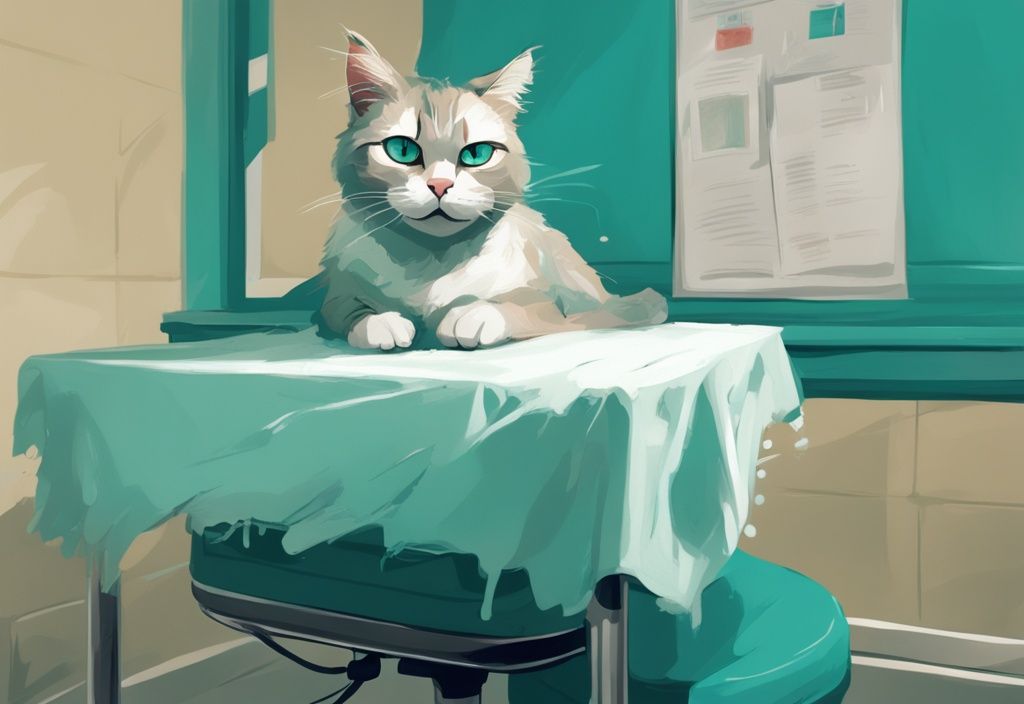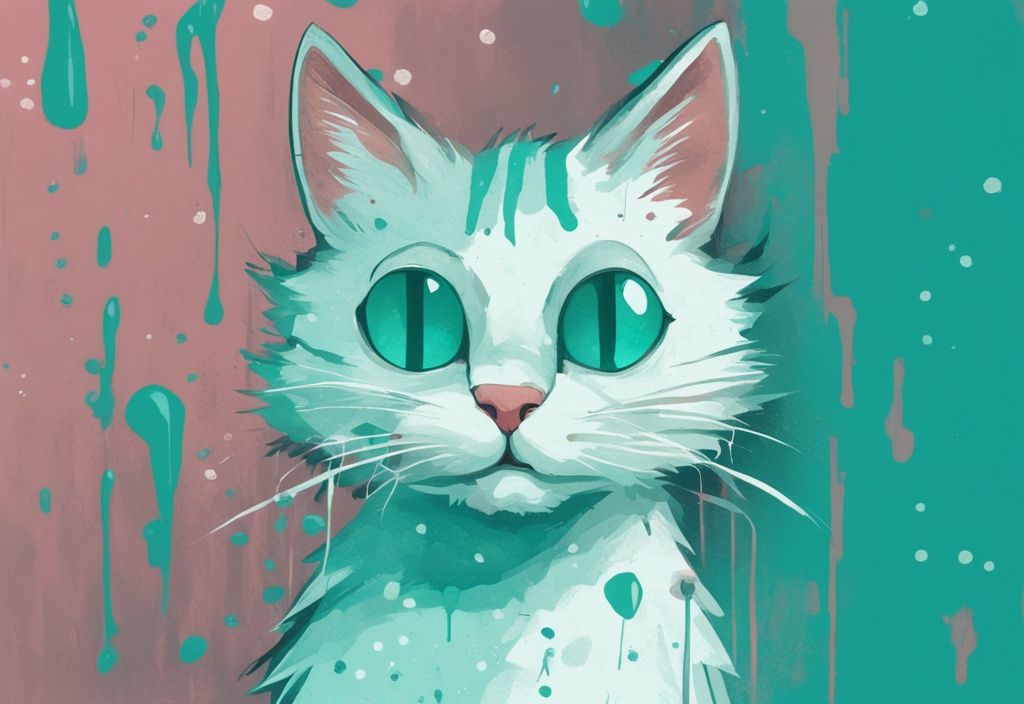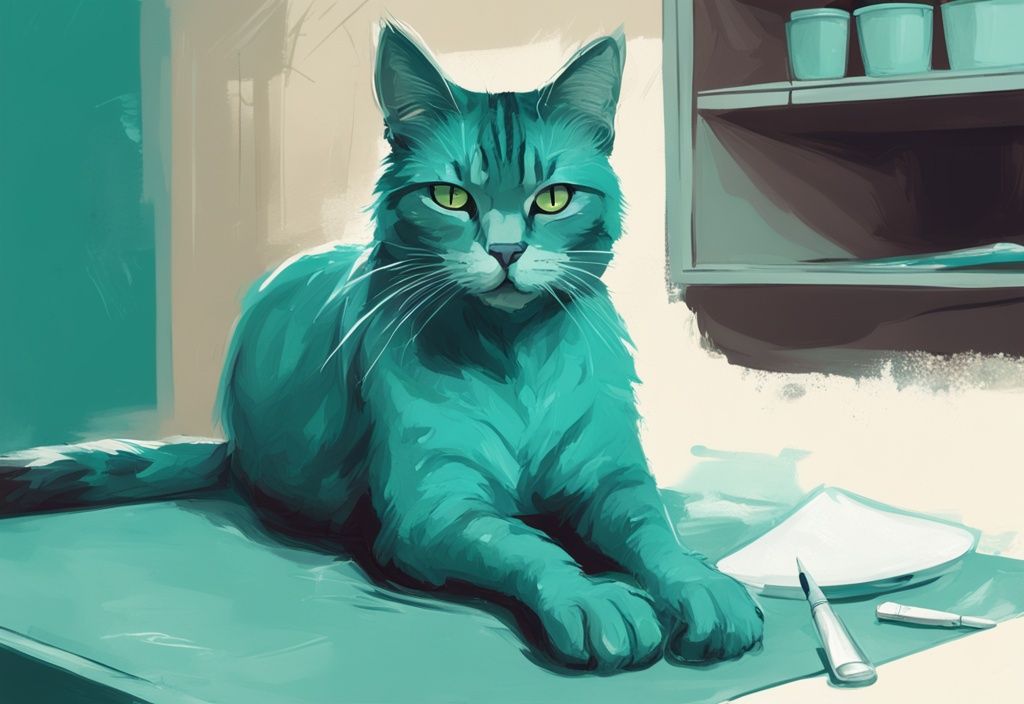Oh dear, seeing your feline friend foaming at the mouth can be quite the shocker! I remember when Whiskers, my cuddly rescue cat, had a similar episode, and my heart skipped a beat. Is it something serious, or just a quirky cat moment? Let’s unravel this mystery together, exploring everything from dental issues to more serious concerns, and figure out when it’s time to call the vet. With a sprinkle of humor and a dash of care, we’ll navigate this curious cat conundrum.
Identifying the Causes of a Cat Foaming at the Mouth
Foaming at the mouth in cats can be quite alarming and often hints at underlying health issues. Let’s explore the common reasons behind this unusual behavior and what they might mean for your feline friend.
Common Reasons: Nausea, Poisoning, Dental Issues, and More
Foaming at the mouth isn’t something you’d expect to see in your cat’s daily antics. It’s a red flag that could point to several potential causes. Nausea is a frequent culprit, which might occur if your cat has indulged in some questionable cuisine, like spoiled food. Or perhaps Whiskers is feeling queasy from a bumpy car ride. Poisoning is another serious concern. Cats are curious creatures, and ingesting toxic substances like certain plants or household chemicals can lead to foaming. Dental issues, such as gingivitis and tooth resorption, can also cause discomfort, resulting in foaming. And let’s not forget about stress! Changes in the environment or a new pet can make your kitty anxious, sometimes leading to physical symptoms like foaming. Although less common, seizures or epilepsy might be to blame, hinting at neurological issues. Viral infections like rabies and calicivirus, though rare in vaccinated cats, can also cause foaming and need immediate attention.
Understanding the Role of Toxic Substances
Toxic substances are often the sneaky villains behind a cat foaming at the mouth. Imagine your cat accidentally ingesting household products or pet products used incorrectly. Pyrethrin-based insecticides, often found in flea and tick treatments, are particularly hazardous if swallowed. Bitter-tasting drugs or toxic plants can also trigger foaming as a reaction to their unpleasant taste or harmful effects. Keeping these substances out of reach is key to preventing accidental ingestion.
How Dental Problems Can Lead to Foaming
Dental health is a cornerstone of your cat’s overall well-being. Issues like gingivitis and tooth resorption can cause significant oral discomfort, often leading to excessive drooling and foaming. Oral ulcers and other dental diseases only make matters worse, making it hard for cats to eat comfortably. If you notice behaviors like head shaking or a sudden disinterest in food, it might be time for a vet visit.
Recognizing the Signs of Viral Infections
Though less common, viral infections can also be behind your cat’s foaming at the mouth. Rabies is a particularly serious viral infection, with symptoms like fever, seizures, and aggressive behavior. While rare in vaccinated cats, it’s still a critical concern. Calicivirus, another viral infection, primarily affects the upper respiratory system and can lead to foaming. Spotting these signs early and seeking veterinary care is essential to manage and treat these infections effectively.

Key Symptoms to Watch for When Your Cat is Foaming at the Mouth
Foaming at the mouth in cats can be a bit of a head-scratcher. Let’s dive into what might be going on and what you should keep an eye out for.
Spotting Changes in Behavior and Physical Condition
Foaming at the mouth can be quite the spectacle, and it’s important to notice any other symptoms that tag along. First up, keep an eye on lethargy. If your usually sprightly feline is lounging around more than usual, it might be a sign of something amiss. Cats are creatures of habit, so when Whiskers, my cuddly rescue cat, suddenly loses interest in her favorite tuna treats, I know it’s time to pay attention.
Vomiting is another symptom that might pop up alongside foaming. If your cat has eaten something disagreeable or toxic, their tummy might not be too happy about it. Watching for signs of distress or discomfort is crucial here.
Behavioral quirks can also give you clues. If your furball starts acting out of character—maybe a bit more aggressive or anxious than usual—it could be linked to whatever’s causing the foaming. Cats are sensitive souls, and stress can show up in unexpected ways.
In more serious scenarios, symptoms like collapsing or trembling are red flags that need immediate vet attention. These could hint at something as serious as poisoning or a neurological problem. Quick action is key to keeping your feline friend safe and sound.
How Vets Diagnose the Cause of a Cat Foaming at the Mouth
What to Expect During a Vet Visit
When your cat starts foaming at the mouth, it’s time to head to the vet. This isn’t just a casual outing; it’s a detective mission to uncover what’s going on with your furry friend. The vet will kick things off by diving into your cat’s medical history. Have they been munching on mysterious plants or gotten into the cleaning supplies? Any quirky changes in their behavior or diet lately? These clues help the vet zero in on the potential culprits.
Next up, it’s time for the physical exam. Picture the vet as a kind of pet detective, checking out your cat’s mouth for any dental dramas like gingivitis or pesky oral ulcers. But that’s not all—neurological conditions or viral infections might be on the vet’s radar too, especially if your cat’s showing other signs like seizures or trouble breathing.
To dig even deeper, the vet might suggest some tests. Blood tests are like a window into your cat’s health, revealing infections, how well organs are working, or if they’ve crossed paths with any toxins. And let’s not forget about imaging techniques—X-rays or ultrasounds can uncover hidden issues lurking inside. Dental exams might reveal sneaky oral health problems, while allergy testing could be on the cards if an allergic reaction is suspected.
Each step in this process is like a puzzle piece, helping the vet figure out why your cat is foaming at the mouth. The goal? To ensure your beloved feline gets the right treatment and care, so they can get back to their purring, playful selves.
Effective Treatments for a Cat Foaming at the Mouth
When your feline friend starts foaming at the mouth, it can be quite alarming. But don’t worry, there are steps you can take to help them feel better. From quick first aid measures at home to understanding the medical treatments available, let’s dive into how you can care for your cat during these moments.
First Aid Measures You Can Take at Home
Imagine this: you’re enjoying a quiet evening when suddenly, your cat starts foaming at the mouth. What do you do? First, stay calm. Gently rinse your cat’s mouth with water to wash away any irritants or sneaky foreign objects. It’s like giving your kitty a refreshing drink, but with a purpose!

After the rinse, take a peek inside their mouth. Look for anything unusual—maybe a tiny toy or a piece of string that’s causing discomfort. Once you’ve done your detective work, keep a watchful eye on your furry companion. Are they showing other signs like vomiting or acting unusually tired? These could be clues to a bigger mystery.
Creating a peaceful environment is key. Just like how Max, my Border Collie, loves his quiet corner, your cat will appreciate a stress-free zone. Loud noises and chaos can make things worse, so let’s keep it serene.
Understanding the Medical Treatments Available
When it comes to medical treatments, it’s all about understanding the root cause. If dental issues are to blame, a visit to the vet might be in order. Think of it as a spa day for your cat’s teeth—gingivitis and tooth resorption don’t stand a chance!
In cases where seizures are the culprit, medication can help manage the situation. It’s like giving your cat a superhero cape to fight off those pesky seizures.
And if poisoning is suspected, quick action is crucial. Removing the offending object or following detox procedures could be necessary. It’s like playing detective, but with a life-saving twist.
Remember, a balanced diet is your cat’s best friend. Regular, nutritious meals can keep them healthy and prevent those pesky dietary mishaps. Just like how Whiskers, my cuddly rescue cat, thrives on her regular meals, your feline buddy will too.
By understanding these treatments, you’re better equipped to handle a foaming-at-the-mouth situation. Your cat will thank you with purrs and head nudges for being their hero!
Preventing Your Cat from Foaming at the Mouth
Keeping your feline friend healthy and happy is a top priority. From regular vet visits to a safe home environment, there are several steps you can take to prevent your cat from foaming at the mouth. Let’s dive into some practical tips that will ensure your cat’s well-being and keep those whiskers twitching with joy!
Steps to Ensure Your Cat’s Health and Safety
- Regular Vet Check-Ups and Dental Hygiene: Just like my Border Collie, Max, loves his playtime, your cat needs regular vet visits. These check-ups are crucial for catching health issues early, including those sneaky ones that might make your cat foam at the mouth. And let’s not forget dental care! Routine teeth cleaning and professional dental exams are as important as your morning coffee. They help prevent oral discomfort and keep those pearly whites in top shape.
- Keep the Home Free from Toxic Substances: Cats are curious creatures, much like my Whiskers who once tried to nibble on a houseplant! To prevent foaming caused by accidental poisoning, ensure your home is a safe haven. Keep household chemicals, medications, and certain plants securely stored away. And if your cat loves the great outdoors, like Max, make sure to supervise their adventures to avoid any environmental toxins.
-

Ensure a Nutritious Diet and Provide a Safe, Stress-Free Environment: A balanced diet is the cornerstone of your cat’s health. High-quality cat food tailored to their needs can prevent issues that might lead to foaming at the mouth. Creating a calm, stress-free environment is equally important. Minimize changes that could cause anxiety—because a relaxed cat is a happy cat. It’s like giving your cat a cozy blanket of comfort, ensuring their well-being and preventing stress-related foaming.
FAQ: Your Top Questions About Cat Foaming at the Mouth Answered
What Immediate Actions Should I Take?
Picture this: your curious cat, Whiskers, suddenly starts foaming at the mouth. What do you do? First, gently rinse Whiskers’ mouth with water and check for any sneaky foreign objects. Keep an eye out for other symptoms, like lethargy or unusual behavior. If the foaming doesn’t let up or seems to get worse, it’s time to make a swift call to your vet. Better safe than sorry, right?
Could This Be a Sign of Rabies?
Ah, the dreaded “R” word—rabies. It’s rare in vaccinated cats, but it’s a serious matter. Look out for symptoms like fever and aggression. If you have even the slightest suspicion that rabies might be the culprit, don’t hesitate. Get Whiskers to the vet pronto. Rabies is no joke, and getting a proper diagnosis and treatment is crucial.
Is Foaming Normal After Medication?
Ever tasted something so bitter it made you scrunch your face? That’s how Whiskers might feel after taking certain medications. Foaming can be a reaction to the bitterness. If you’re curious about how to shave a cat, it’s important to be gentle and calm, ensuring their comfort throughout the process. While it’s usually not a big deal, keep an eye on Whiskers for any other signs of distress. If you’re worried about how the meds are affecting your furry friend, a quick chat with your vet can put your mind at ease.
How Can I Keep My Cat from Ingesting Harmful Substances?
Think of your home as a treasure trove of potential mischief for Whiskers. Household chemicals, medications, and even some plants can be hazardous. Keep these out of reach, and opt for pet-safe products. When Whiskers is out exploring the great outdoors, supervise to prevent any accidental taste tests of harmful substances. It’s all about creating a safe and happy environment for your curious companion.
Conclusion
Foaming at the mouth in cats might seem like a scene from a cartoon, but in reality, it’s a signal that something’s not quite right with your furry friend. Whether it’s a dental dilemma or a sneaky encounter with something toxic, this bubbly symptom is your cat’s way of waving a red flag.
Imagine catching Whiskers in the act—foaming like a cappuccino gone wrong. It’s crucial to act swiftly! Early detection and treatment are like the superhero duo that saves the day, preventing those pesky complications from taking over. Spotting the signs early means you can whisk your kitty off to the vet, who can play detective and figure out what’s causing all the fuss. Whether it’s a sneaky toy stuck in their mouth or a dental drama unfolding, timely intervention can turn the tide for your cat’s health.
Now, let’s talk prevention. Regular vet visits are like a spa day for your cat’s health—keeping them in tip-top shape. And don’t forget to cat-proof your home! A safe environment, free from toxic temptations, combined with a balanced diet, is your best bet. By creating a stress-free haven, you’re not just preventing foaming at the mouth; you’re ensuring your cat lives their best life—happy, healthy, and full of purrs.
After all, a little extra care goes a long way in keeping our whiskered companions by our side, ready for more adventures and cuddles.
